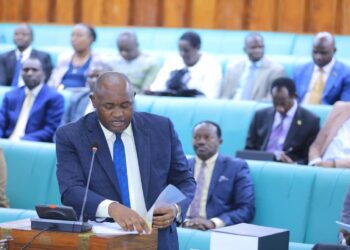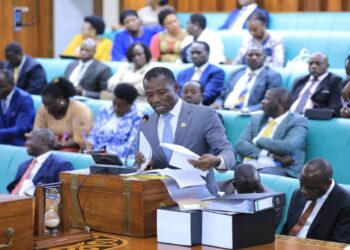In a startling revelation, political commentator and former Senior presidential secretary Joseph Tamale Mirundi has thrust the spotlight on what he claims to be a web of nepotism entangling the highest echelons of power in Uganda that may birth damaging of the economy.
During an interview with a local Youtube channel this week, Mirundi made an explosive disclosure suggesting that President Museveni is responsible for jeopardizing the nation’s economic stability by favouring his son-in-law Odrek Rwabwogo with control over major exports.
In this exposé, Mirundi reveals that Uganda’s major agricultural produce have all been given to Rwabwogo, a move that has put Uganda’s economy at risk. Mirundi’s alleged preferential treatment towards the President’s son-in-law in matters of national commerce could ignite concerns about ethical governance and the equitable distribution of opportunities.
As citizens grapple with the implications, this revelation casts a shadow on the administration’s commitment to fostering a level playing field for all Ugandan businesses, prompting calls for accountability and a closer examination of the nation’s leadership decisions.
“This egregious error, I believe, is a divine intervention with America terminating the AGOA program. It was meant to uplift all Ugandans, but it ended up in the hands of one individual. Had it truly been a boon for our country, the streets would have echoed with joyous demonstrations. Yet, the absence of such speaks volumes—this privilege was monopolized. The insatiable control this individual exerts over the exports of fundamental commodities like fish, meat, milk, and coffee is steering our economy into an imminent downfall. We’re not merely facing a stumble; it’s akin to experiencing total organ failure,” asserted Tamale Mirundi.
Mirundi’s poignant remarks strike at the heart of a nation grappling with the repercussions of apparent favouritism. The alleged concentration of power and resources in the hands of one individual rather than benefitting the collective populace has ignited widespread concern. The exports mentioned, vital to Uganda’s economic health, have become enmeshed in a narrative of nepotism and privileged control. The fallout of this alleged mismanagement looms ominously, raising fears of an economic collapse that could reverberate across the nation.
Mirundi’s stark warning also serves as a clarion call for heightened scrutiny and corrective measures. The termination of the AGOA program, once a beacon of opportunity, now stands as a stark reminder of the consequences when entrusted resources become the purview of a select few.
“I can authoritatively tell you that Museveni’s downfall will come from this man!” he warned.
Meanwhile, as Uganda grapples with Tamale Mirundi’s damning allegations of nepotism at the highest levels of power, the implications reverberate far beyond the realms of politics. The integrity of governance, the vitality of the economy, and the principles of equitable opportunity hang in the balance.
The gravity of these accusations underscores the urgency for thorough investigations and an unwavering commitment to uphold the principles of fairness and integrity in steering the country’s future trajectory.
Do you have a story in your community or an opinion to share with us: Email us at editorial@watchdoguganda.com













